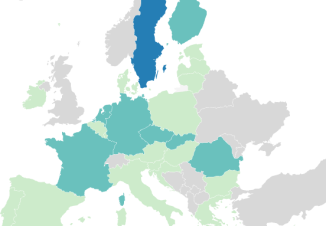
From: SHRM.org – A link to the online article can be found here.
The European Union (EU) Working Time Directive requires that all EU countries guarantee specific employee rights, including a limit to weekly working hours (including overtime), a minimum daily and weekly rest period, and a rest break during work hours. There may be variances in how the directive is implemented country by country, but overall the directive is enforced similarly across EU nations.
The EU Directive
According to the EU directive, employees in EU countries have the right to:
Some exemptions are possible in certain circumstances or can be negotiated between employers and employees.
General Rules on Working Hours
In Italy, working time provisions are included in the law, which has implemented the EU directive, and in national collective bargaining agreements (NCBAs) for each industry, which may deviate slightly from the legal framework. It is, therefore, always important to check the applicable collective bargaining agreements.
Generally, the standard workweek is 40 hours. However, the relevant NCBA can stipulate a lower maximum or provide that it is calculated on average hours worked over a year. In practice, the Italian workweek is usually five eight-hour workdays (Monday to Friday).
In Denmark, standard work hours are not stipulated by law. In accordance with the EU directive, however, employees must not work more than 48 hours per week (including overtime), calculated over a four-month reference period. More-specific provisions on work hours usually follow from an applicable collective bargaining agreement or tailored individual contracts. Such provisions must comply with the Working Time Directive; thus, the 48-hour rule cannot be avoided.
Similar provisions exist in Belgium, where legislation on working time and the rules provided by the NCBA should be considered when hiring employees.
The general legal framework requires that Belgian employees work within their working schedule, which is in principle limited to eight hours daily and 38 hours weekly. Night working between 8 p.m. and 6 a.m. or working on Sunday or on public holidays is in principle forbidden in Belgium.
Certain categories of employees, however, can be employed in a much more flexible way, as they are not bound to most of the working time legislation. This applies, for instance, to employees with a management function or those in a position of trust within the company.
Days of Rest and Breaks
Rules on breaks and rest are almost identical across each analyzed jurisdiction and comply with the EU directive’s principles.
In Denmark, employees are entitled to a break of a reasonable length if their workday exceeds six hours. Danish employees are also entitled to a rest period of a minimum of 11 consecutive hours in every 24-hour period, and one day (i.e., 24 hours) off every week—preferably on a Sunday.
Italy has similar provisions. Employees working more than six hours a day are entitled to a break, usually specified in the NCBA or in individual agreements. In any case, employees are entitled to a break of at least 10 minutes for every six work hours.
As in Denmark, Italian employees are entitled to a daily rest period of 11 consecutive hours for every 24 hours and a weekly rest period of at least 24 consecutive hours every seven days, in addition to the daily rest period (generally, but not exclusively, on Sunday). This weekly rest period is calculated as the average over a 14-day period.
As noted above, in Belgium, night working (i.e., between 8 p.m. and 6 a.m.) or working on Sundays or public holidays is in principle prohibited and employees must be granted sufficient rest between two working days (usually 11 hours) and breaks during the workday.
Overtime
In Belgium, a legal ground is required when granting overtime, such as an exceptional increase in workload, a situation of “force majeure” (i.e., unforeseeable circumstances) or the employee’s explicit prior consent (also called “voluntary overtime”), usually allowing work up to a maximum of 11 hours per day and 50 hours per week.
In Italy—where overtime relates to any performance exceeding 40 hours per week and is usually ruled by NCBAs—working time, including overtime, cannot exceed 48 hours per week, calculated with reference to a period not exceeding four months, unless the NCBA stipulates a longer period, equal to six or 12 months if certain specific technical reasons exist.
If no NCBA exists, overtime is allowed only by individual agreements between the employer and the employee, and for a maximum period of 250 hours per year.
As in Italy, Danish employees must not work more than 48 hours per week on average, including overtime. However, according to Danish law, employers do not need any specific grounds for requiring employees to work overtime. More-specific provisions on overtime usually follow from a collective agreement, if applicable.
Thanks to the EU directive, working hours legislation across EU countries is generally similar. Employers could, therefore, have global policies at a European level on work hours containing general guidelines and principles applicable in each country in which they operate. It is worth bearing in mind, however, that it is always advisable to also adopt a local approach to working time regulations to ensure compliance with mandatory provisions of each relevant jurisdiction.
Reprinted with permission from SHRM.org. c 2018. All rights reserved.


